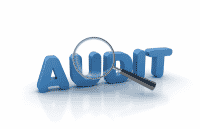The first external audit of your firm might be stressful. The audit firm will ask for a lot of information from your company, and there’s a lot of information about how audits should work if you want to prepare for it ahead of time. Depending on the scope and standard against which you will be audited, your audit experience will be unique to your organization. Here are a few critical things you need to know about the external audit, software, how to prepare it and so much more.
External audit
External auditing is defined as the examination of the financial records of a company by independent auditors in order to determine the validity of the financial records and determine if there is any misstatement in the records due to fraud, error, or embezzlement, and then reporting the findings to the company’s stakeholders.
The external audit’s goal is to determine the completeness and accuracy of the client’s accounting records, to ensure that the client’s records are prepared in accordance with the accounting framework that applies to them, and to ensure that the client’s financial statements present true and fair results and financial position.
Overview
The primary goal of an external audit is to determine the completeness and accuracy of the client’s accounting records, to ensure that the records are prepared in accordance with the accounting framework that applies to them, and to ensure that the client’s financial statements present true and fair results and financial position. A statutory auditor has the right to request the company’s financial books, records, or information, which the management cannot refuse.
The external auditor is to issue an audit report after conducting the audit and obtaining the necessary information.
in writing, based on various evidence and data gathered on the honest and fair assessment of the financial statements submitted to him by the involved parties.
An external audit is most typically to obtain certification of a company’s financial statements. For their analyses, certain investors and lenders require this accreditation. Furthermore, all publicly traded companies or corporations that sell their stock to the general public are by law to have their financial accounts receive this certification.
Example of External Audit
The clothing is by XYZ Ltd., which is a publicly traded corporation that sells its shares to the general public. The business wants to know if they are to have its financial accounts audited by an external auditor.
All publicly-traded organizations or corporations that offer their shares to the general public are required by law to have their financial statements audited by an external auditor. The goal is to determine the completeness and accuracy of the client’s accounting records, to ensure that the records are prepared in accordance with the accounting framework, and to ensure that the client’s financial statements portray a truthful and fair financial situation. As a result, the company would select an auditor to conduct the firm’s external audit and issue a written audit report based on the various evidence and information acquired on the true and fair view of the financial statements submitted to him by the involved parties.
Roles & Responsibilities of an External Audit
The primary task is to verify the company’s general ledger and to make all other necessary questions of the company’s management. It assists in determining the true image of the company’s market and financial status, which then serves as the foundation for managerial decisions.
Examine financial records for accuracy to see whether there is any misrepresentation in the company’s records due to fraud, error, or embezzlement. As a result, it improves the authenticity and reliability of financial statements as well as the company’s financial statements. If there are any accounting mistakes,
If the firm’s process is upset, it may prevent the company’s owner from making the best decisions for the company. An audit aids in the resolution of this issue to a large extent because the methods in the audit are designed to aid. In the detection of system problems as well as other fraudulent behavior. Audits also guarantee that accounting transactions are in accordance with general accounting principles.
5 Tips To Prepare For Your External Audit
#1. Understand the Standard
An audit is a report that compares your company’s performance to an external standard. So read and understand the standard you’ll be measured against. It’s crucial to know how the external auditors will approach the situation. Furthermore, touching on areas outside the scope of the audit will assist you in avoiding taking unneeded steps. Having a general grasp of the external audit might help you manage it more effectively.
#2. Identify Your Subject Matter Experts (SMEs)
Your own SMEs are the best experts on your internal processes. Determine which of your employees has the best knowledge to assist the external auditor. In understanding and evaluating your business and information security processes, based on the standard you must comply with. Make sure those SMEs understand the significance of the upcoming audit and present their understanding of the standard so the auditor can use their knowledge and experience to help prioritize actions for preparation.
#3. Allocate Resources to the Experts
Experts and specialists in various fields are frequently busy with their regular tasks. Your SMEs will have to devote a lot of time, energy, and effort to auditing. Make sure that all of the resources you’ll need are on hand so that your audit team can get the job done quickly.
Experts and specialists in various fields are frequently busy with their regular tasks. Your SMEs will have to devote a lot of time, energy, and effort to auditing. Make sure that all of the resources you’ll need are on hand so that your audit team can get the job done quickly.
#4. Determine Your Internal Procedures
Gather your SMEs and go over internal audit processes that are relevant to the controls that will be examined during the audit. The goal is to find any gaps where processes don’t exist or don’t meet the standard against which you’ll be audited. In other words, make sure your company has all of the controls required by the standard, and that any necessary corrective actions are taken.
#5. Gather Documentation for Your Procedures
It’s a good start to have all the internal procedures in place. External auditors, on the other hand, will request supporting documents as part of the auditing process. Policy documents, financial statements, accounting records, and “process artifacts” are all things they’ll want to see (that is. Evidence that your internal processes are working as intended).
Make a list of documents that demonstrate the present internal control structure and review them. You can do so, based on the business processes identified in the previous phase. This is a different type of gap analysis that you can use to see if your documentation is correct and full.
What is the Purpose of an External Audit?
An independent and objective examination is going to be carried out as part of an external audit. This examination is going to verify that the company’s financial statements are giving an accurate and fair reflection of the company’s current financial position and that they have been appropriately prepared in accordance with accounting standards.
What are the Qualifications of an External Auditor?
External auditors do not yet have a standardized set of requirements that must be met in order to work, but successful candidates typically hold a bachelor’s degree in accounting or a field that is closely related to accounting, and they also have previous experience working in accounting roles within the types of organizations that they audit.
What Do External Auditors Do?
External auditors examine the accounting records of their clients and provide an opinion on whether or not the client’s financial statements are presented fairly in accordance with the accounting standards that are applicable to the entity, such as Generally Accepted Accounting Principles (GAAP) or International Financial Reporting Standards (IFRS).
Limitations of External Audit
The audit is looking over a sample of the company’s data that the auditor believes is relevant to his investigation. An auditor does not examine and evaluate all of the business’s transactions. Thus, depending on the sample data provided to him. He simply offers his audit opinion on the financial statements and data. As a result, this does not provide complete certainty about the company’s financial status.
The costs of performing an audit could be very significant.
Humans are in all stages of accounting. From the preparation to the finalization of financial statements and the expression of the audit opinion, making it prone to error. In addition, if an auditor lacks expertise or experience,
External audit software
#1. CaseWare external audit software
Founded in 1988, CaseWare International is an industry leader in providing technology solutions for audit, accounting, and government. With over 500,000 users in 130 countries and 16 languages, CaseWare products deliver tremendous value across industries and continents.
CaseWare IDEA is a subsidiary of CaseWare International and offers innovative data analysis tools for auditors, accountants, finance professionals, and data professionals. Its flagship product, IDEA, allows users to analyze 100 percent of their data, guarantees data integrity, and provides easy analysis with over 100 audit-relevant tasks.
#2. MasterControl Inc. external audit software
MasterControl Inc. creates software solutions that enable life science and other regulated companies to deliver life-improving products to more people sooner. MasterControl’s integrated solutions accelerate ROI and increase efficiencies by automating and securely managing critical business processes throughout the entire product lifecycle. More than 1,000 companies worldwide use external audit software, ranging in size from five employees to tens of thousands. All rely on MasterControl cloud solutions to automate processes for new product development, clinical, regulatory oversight, quality management, supplier management, manufacturing, and post-market surveillance. MasterControl solutions are well-known for being scalable, easy to implement, easy to validate, and easy to use.
#3. DreamAudit external audit software
It’s easy to save time and generate well-organized, high-quality work. DreamAudit is a cloud-based, digital auditing solution that will save you both time and money. Its basic data tree is broken down into five simple steps, with real-time ISA updates. This means that users are more productive, especially with the automated process applied to all papers and the ability to collaborate in real time.
DreamAudit can handle your complete audit engagement, wherever and whenever you choose. DreamAudit is the appropriate assistance for your financial auditing needs, as it was by auditors for auditors. With Dream external audit software, you can embrace the digital transition.
Internal audit Vs external audit
There are multiple differences between the internal audit and external audit functions, which are as follows:
- Internal auditors are company employees, while external auditors work for an outside audit firm.
- Internal auditors are hired by the company, while external auditors are appointed by a shareholder vote.
- IA does not have to be CPAs, while a CPA must direct the activities of the external auditors.
- Internal auditors are responsible to management, while external auditors are responsible to the shareholders.
- Internal auditors can issue their findings in any type of report format. While external auditors must use specific formats for their audit opinions and management letters.
- Internal audit reports are used by management, while external audit reports are used by stakeholders. Such as investors, creditors, and lenders.
- Internal auditors can provide advice and other consulting assistance to employees. While external auditors are from supporting an audit client too closely.
- Internal auditors will examine issues related to company business practices and risks. While external auditors examine the financial records and issue an opinion regarding the financial statements of the company.
- Internal audits are conducted throughout the year, while external auditors conduct a single annual audit. If a client is publicly-held, external auditors will also provide review services three times per year.
In short, the two functions share one word in their names but are otherwise quite different. Larger organizations typically have both functions, thereby ensuring that their records, processes, and financial statements are closely checked at regular intervals.
What an External Audit Involves
Due to the limited amount of time available for any external audit, the auditors will not focus their attention on every single result, figure, or transaction in the accounts that they are reviewing. Instead, they will concentrate their attention on a carefully chosen sample of the results, figures, and transactions. The audit should ideally be viewed as a constructive process that is aimed to highlight the strengths and flaws of the way your organization is operated, rather than as a test that is seeking for some type of wrongdoing. This is the ideal way in which the audit should be treated.
What is an External Audit Report
After the external audit has been finished, the auditors are supposed to deliver a report that details the “audit opinion” that has been determined officially. This will determine whether or not the prepared financial statements present an accurate and objective view of the businesses’ operations and financial affairs during the time being audited. If this is the case, then the report will state the fact, with “true” referring to the fact that all transactions listed took place and all assets referred to do exist, and “fair” confirming that assets and liabilities are listed fairly and that the value assigned to any transaction is fair. If this is the case, then the report will also state that the value assigned to any transaction is fair.
What are the Aims of an External Audit?
In layman’s words, the purpose of an external audit is to ascertain the current state of a company and the operations it has been conducting during a given time period. A company of certified public accountants will be the ones to carry it out. It may take place as part of a routine annual review or during a special review, depending on the circumstances. Either at an annual general meeting (AGM) or by the board of trustees, auditors will be selected to serve the organization.
It is of the utmost importance that the auditors be independent. This implies that they cannot have any kind of personal connection to your company and that they cannot have had any kind of hand in the preparation of the accounting records that are currently being audited.
What to Look for When Choosing Auditors
Auditors who are appointed to carry out an external audit need to be independent in addition to holding the appropriate professional qualifications. Auditors should be selected for the job based on their reputation, the amount of experience they have auditing businesses that are comparable to the target company, and the amount of money they will charge for carrying out the audit.
Conclusion
As a result of the foregoing, it can be inferred that an external audit is one of the most common types of audit. Auditors examine accounting books, purchase records, inventories, and other financial data to ensure that the company is operating properly. They arrange their audits and operate around them. Also, decide whether or not the company adheres to GAAP. They conduct the test and then provide a full report to the parties involved. It is done with the goal of gathering various data so that the auditor can render an opinion on the truthful and fair assessment of the company’s financial status as of the balance sheet date because the financial statements of the company are prepared by an independent third party. An external audit strengthens the authenticity and trustworthiness of financial statements.
FAQ
What are the 3 types of audits?
There are three main types of audits: external audits, internal audits, and Internal Revenue Service (IRS) audits. External audits are commonly performed by Certified Public Accounting (CPA) firms and result in an auditor’s opinion which is included in the audit report.
What are the four types of auditors?
The four types of auditors are external, internal, forensic and government.
What is audit example?
The auditing evidence is meant to support the company’s claims made in the financial statements. And their adherence to the accounting laws of their legal jurisdiction. Examples of auditing evidence include bank accounts, management accounts, payrolls, bank statements, invoices, and receipts.






